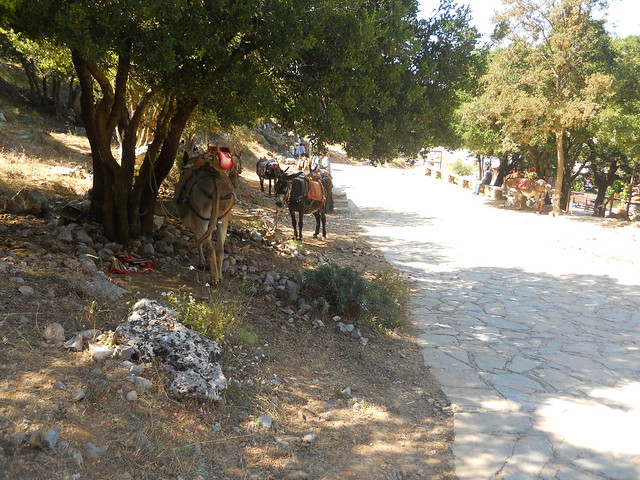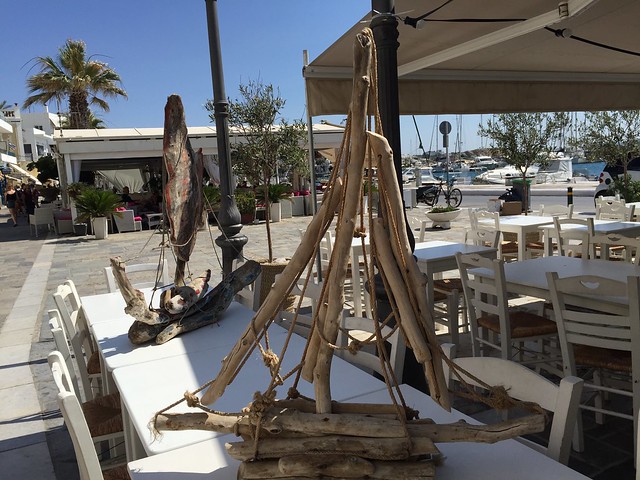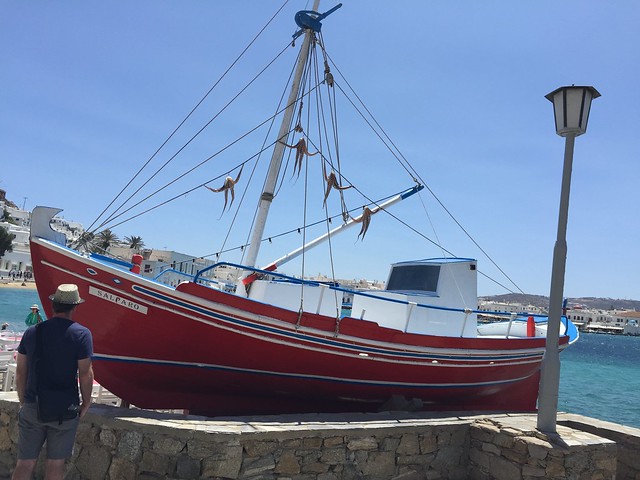Posts tagged ‘Greece’
May 5

Greece is Burning in More Ways than One and Its Neoliberalisms Fault
I had to fly back to Athens from Rome last night after my week at the Collegium Phaenomenologicum. I had arranged to stay at a place I found at hotels.com that turned out to be the guest house of a residence in the town adjacent to the airport. Soon after I booked the place I received an email informing me that I would have to pay another €20 for a cleaning fee when I arrived. Since I was unable to cancel and had not been aware of this fee before I booked I requested that it be waived. The owner agreed. He kindly arranged an “airport shuttle,” which he said would be cheaper than a regular taxi at €15 each way. At the airport a man was waiting for me holding a sign with my name on it. He told me that the police had hassled him for stopping right outside the airport and so he had to park in the pay parking lot, which he told me cost €4. I was skeptical because I had been dropped off by a Greek colleague and I saw signs saying the first 20 minutes were free. We got to his cab and drove off. On the way he told me that he was old and tired. He also told me that the recent fires were in the area about 10-20 kilometers away.
Walking to Plato’s Academy
Today we walked from our place in The Mets to Plato’s Academy, about five kilometers – it’s about 1.5 miles from the Agora. My colleague Lew Cassity is working on a book on Plato’s Laws and wanted to get a sense of how the walk from the Agora to the Academy would feel. We stopped off at the Kerameikos, where the Sacred Road that led to the Academy begins, and then we walked up Platonos all the way to the Academy.
When I was here in 2014, we took the bus out there and it seemed to take forever. I think it probably took as long as our walking it this time. In 2014, I remarked how unmemorial like the site is, less so even that Aristotle’s Lyceum. Like I said then, I guess, as Thucydides wrote, famous men have the whole world as their memorial; they don’t need statues. Read more
The Art of Conversation At the End of a Common World
Yesterday at breakfast I proposed a thesis about the structure of Socratic questioning that my friend John Bova once put to me as we were reading the Charmides together in Greek. His thesis that I have found useful is that Socrates’s interlocutors often begin with a definition that is a particular, like quietness in the Charmides, whose problem is that it lacks a sense of the good. But then when the good is offered as a definition of the virtue, as Critias does in the Charmides, it lacks any concrete meaning. Socrates is then dialectically trying to pull together the concrete sense with the good, or my way of understanding this is to concretize the good. Bova talks about this in terms of a Badiouian kind of diagonalization, but I think it could be understood as manifesting the good in the production of the self.
My colleague Kevin Miles responded to my claim rather forcefully. He said, what could that possibly mean? Like me, Kevin doesn’t think that the good has a metaphysical reality in Plato’s dialogues. What could I have meant by the good? We spent an hour or so over breakfast working it out. My colleague Lew Cassity thinks of the dialectical interplay in terms of weighing pleasures and pains. We tried to get to the point, not where we agreed with one another as much as where we understood what we each were saying. It looks awhile. Along the way there were moments of real tension, maybe even frustration, but in working it out, I found the disagreements themselves helped illuminate and clarify what we were thinking. Without the disagreement, the specificity would not have been reached. Read more
The Reality of Appearances at the Acropolis
Jetlagged and underslept, I went out early this morning into Athens and ran from our flat around the Acropolis and back. The Acropolis was empty, just the way I always think of it as a ruin, standing by itself, the lack of tourists giving the suggestion that the gods might still hover around. Four years ago when I was here I wondered about whether the religious sense of the space could be experienced if one were alone. It certainly does not feel as if it can be when overwhelmed by selfie-stick wielding tourists.
As we were approaching the top of the Acropolis, my colleague from Antioch Lew Cassity pointed out that the Greek Doric columns were asymmetrical, for two reasons. One reason was that they looked more energetic that way. The second was that if they were asymmetrical they would look uneven from a distance. My other co-traveler and colleague at Earlham College Kevin Miles raised the Protagoraean question about the reality of the appearance. Why suppose the appearance from a distance is less real, less how it appears, than the up close appearance of the asymmetry of the columns? Why think the columns really are asymmetrical than think they really are symmetrical because they appear so from farther? Read more
Photographic Records of Crete, Naxos, Delos and Mykonos
Now that I’ve had some time (three days) back at home before we leave again for another (more mundane) trip, I’m posting pics from Greece. Enjoy!
Crete
Naxos
Delos
Mykonos
Crete: Even Ancient History has an Ancient History
First photograph is of the town of Chora, Naxos seen through the ruins of the Apollo temple.
Today we leave Crete, traveling on to the second half of our journey — studying Derrida in Italy. What has been most impressed upon me during our time in Crete is how much human history precedes what I think of as the beginnings of history. As someone who teaches and writes about ancient Greek philosophy, I’m often trying to get students to think about how Greek thinkers are in conversation with their context and how we remain in conversation with the Greeks as part of our context. It’s not just that students don’t understand the thinking of the Greeks without understanding their context, it’s that they don’t think that the Greeks have a rich context. If we just think the Athenians consider themselves to have sprung out of the ground–to be autochthonous, to come from where they are–and we know of nothing that precedes them, this might seem like a reasonable claim, one we have no cause to be suspicious of, just like Americans assuming that we have more claim to be here, we have who have been here for ten generations, than those who are just arriving if we know nothing of the history of what preceded our ancestors ten to fifteen generations ago. Read more
Five Easy Steps to being an Agent of Imperialism
Agent of Imperialism, noun: carrier of empire. An agent of imperialism is one who imports the reigning hegemonic values wherever she goes. She assumes that those at the borders of empire desire the empire and are pleased to see it arrive.
1. Shop at Starbucks, Ben & Jerry’s, the Gap, only at places you could have shopped at the mall at home. Also, complain about the lack of malls.
2. Use your credit card instead of cash especially in cash-strapped countries. If they ask for cash, demand that they take your credit card.
3. Speak English. Don’t even ask if the person to whom you speak speaks English before you begin speaking. Assume everyone does. Don’t bother to learn simple phrases before you go. When you return home, continue to demand that everyone visiting or emigrating speak English.
4. If people do things differently than you do at home, like charge you for the bread they bring to the table even if you didn’t order it or charge you a nominal table fee, insist that your way is the right way. It’s patriotic.
5. Mention suing people for things you don’t like–tiny streets with fast cars, cobblestones, not being able to get into your room when you arrive at the hotel, whatever you can think of.
Good luck and enjoy taking the empire to the world! America thanks you.
Delos: Island of Islands OR More Beasts and Sovereigns
This picture is what erupted into view at the crest of the mountain on Delos that had previously hid itself entirely from view.
In his book, Sojourns, Heidegger journals his travels through Italy and Greece and the Greek islands. I have something of a love-hate relationship with Heidegger. I couldn’t think the way I do nor read ancient texts as I do without the influence of Heidegger. And yet, when he writes things like: “The Asiatic element once brought to the Greeks a dark fire, a flame for their poetry and thought to reorder with light and measure,” I want to scream. Heidegger holds a common prejudice that I tease my students for adopting so easily: the East is exotic, full of fire and passion and the West brings order and logic. When I read that line, I was put in mind of Foucault’s discussion of the Chinese encyclopedia in the Introduction to The Order of Things. Read more
Zeus, Caves, a Goat, and another Bull: The Beast and the Sovereign, Pt. 2
I just returned to Heraklion from several days driving around Crete. I’m particularly impressed by how little the Olympian gods are on display here. The Minoans, as we learned at the Heraklion Archaeological Museum, worshipped the snake goddess. The same snake goddess who is defeated by Apollo to establish himself at Delphi. And yet, Zeus nonetheless is part of the story on Crete, particularly as situating himself as the beast and the sovereign, a theme I keep returning to in light of my summer reading of Derrida. For Derrida, the relation of the beast and the sovereign is peculiar because the sovereign is both what is most separated, other than, the beast and what becomes beastly in order to maintain, enforce or display sovereignty. Hobbes’ Leviathan is the sovereign who must be a beast to maintain power. Rousseau’s sovereign must be a wolf. Machiavelli’s a lion and a fox. For Derrida, the effort to drive out the beastly appears to produce the beastly in what attempts to drive it out. Thus, at the heart of the logic of sovereignty, even in human sovereign rationality, there lurks a beast. I can’t help but see this beastly sovereign in all the stories on Crete where Zeus, the sovereign Olympian appears.

















